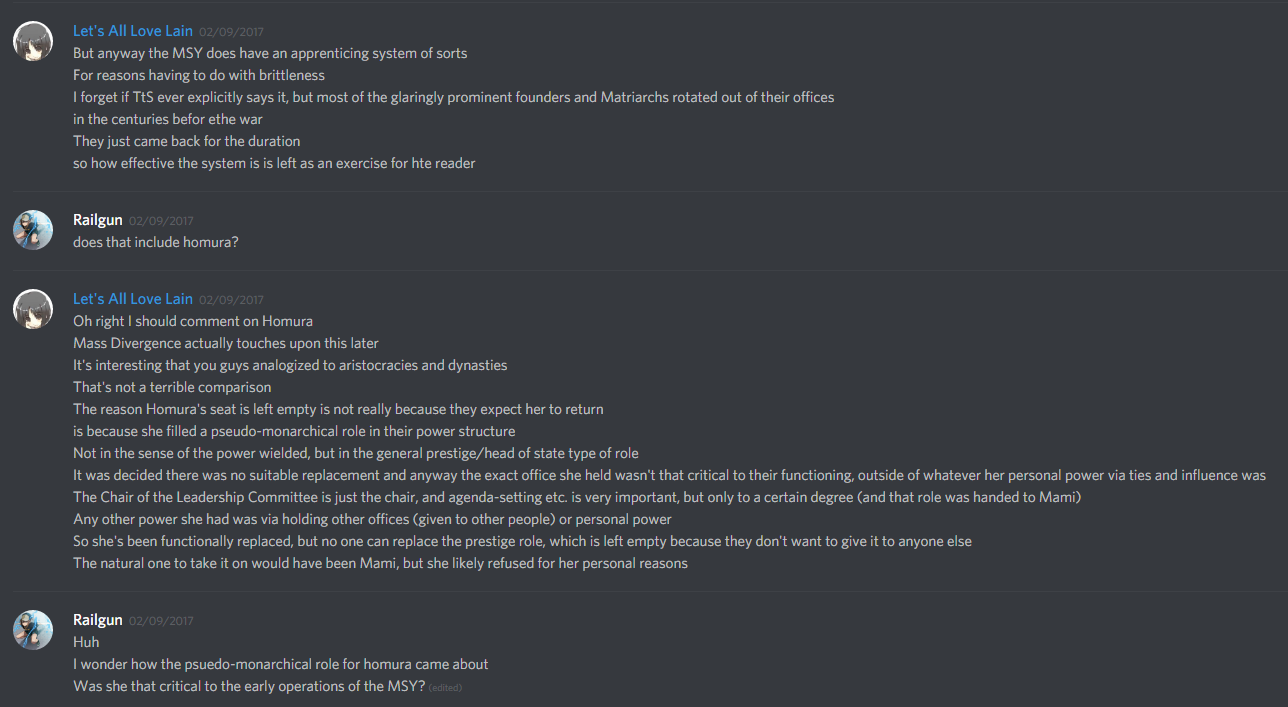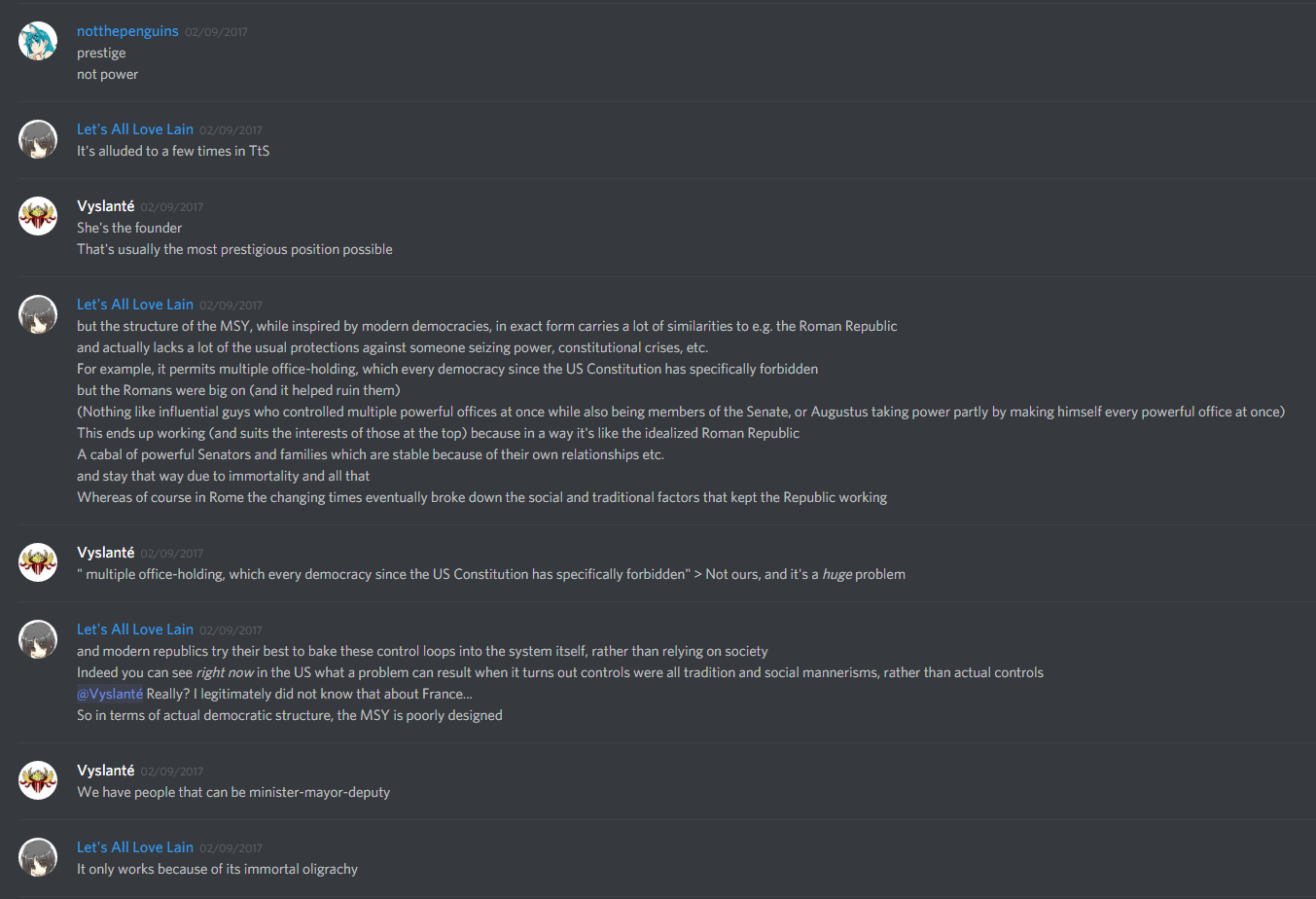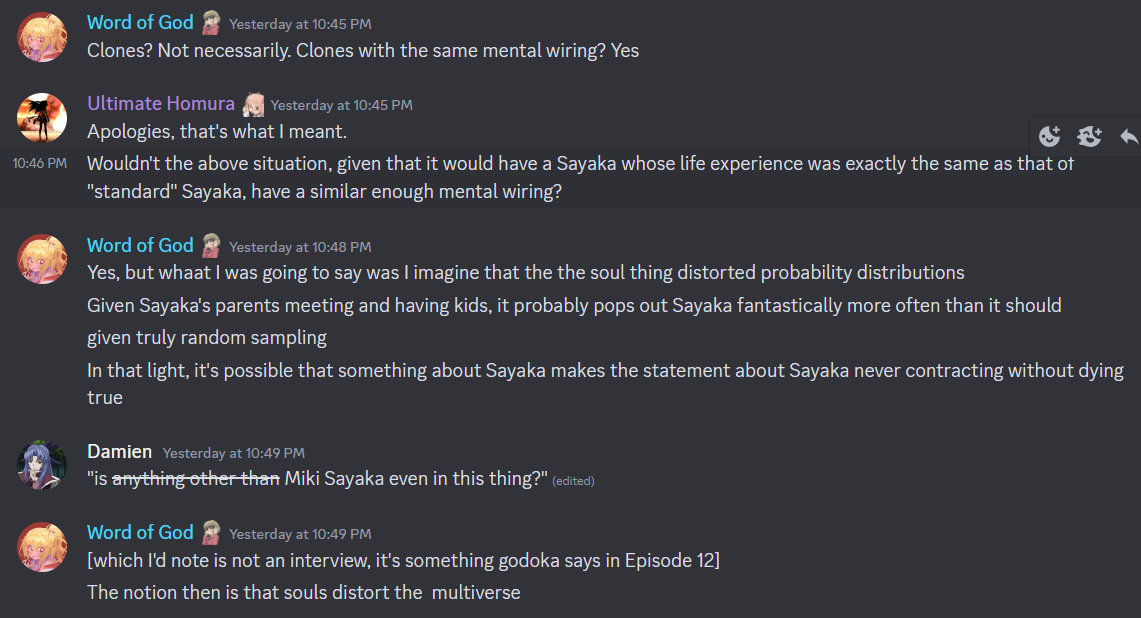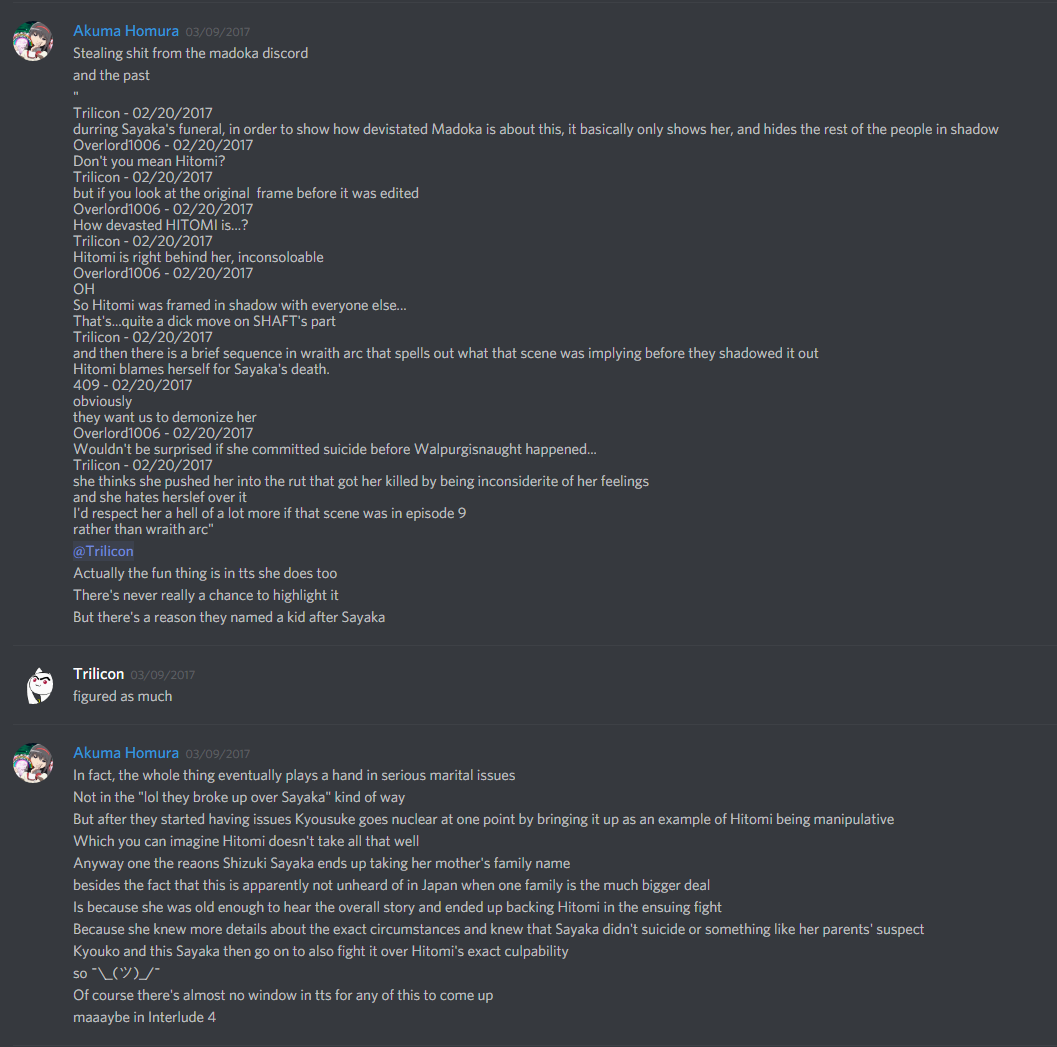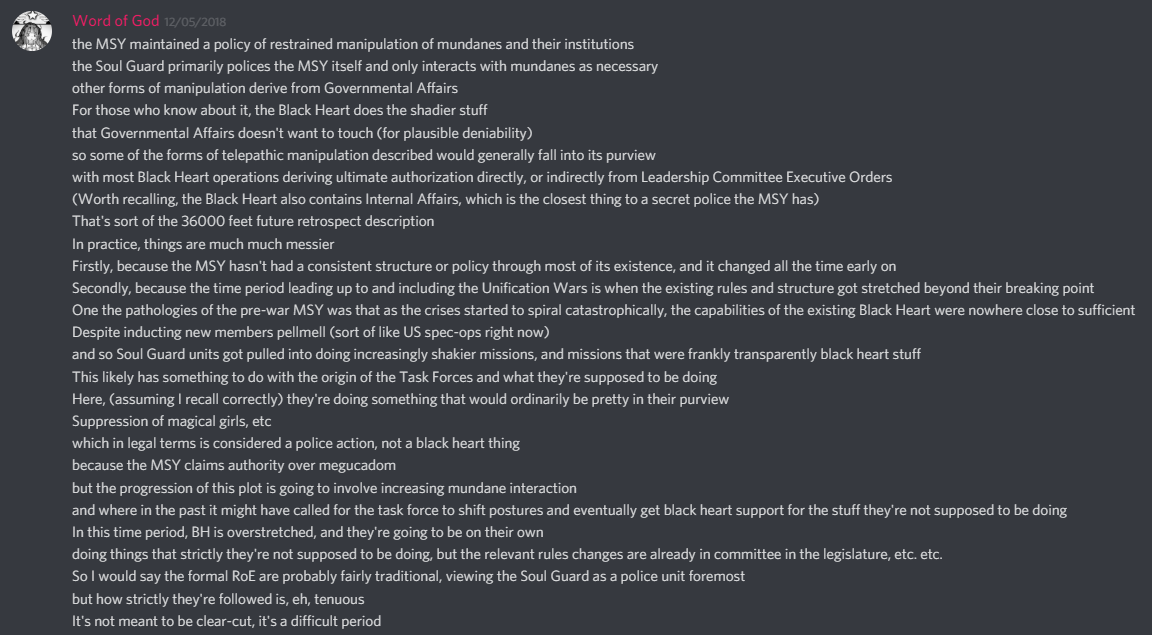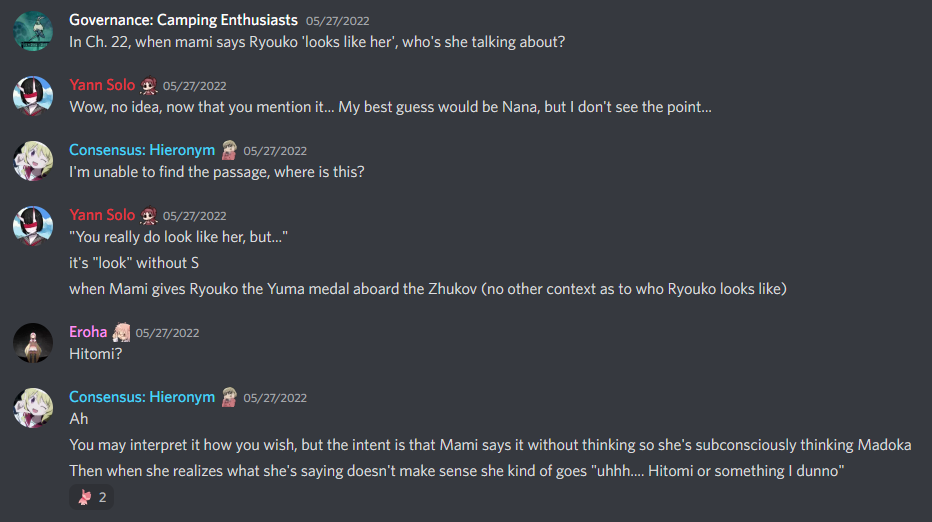Words of God
Here, you can find a fairly complete list of Hieronym's comments on various To the Stars subjects, organized by source.
Word of God[edit]
Canonicity: Probably Canon - author's own speculation and ideas. Can be overridden by later decisions.
These do not contain direct spoilers of unreleased content, but do sometimes openly discuss matters only implied so far, or give vague hints towards the future.
Sufficient Velocity[edit]
Sufficient Velocity Discussion Thread
Copied and continued from the original SpaceBattles thread, this is the prime source of discussion and speculation for To the Stars, running since early 2013.
Because the source posts are often buried in unrelated discussions and responses, the relevant sections have been pasted below. Topic subjects are paraphrased, answers are verbatim and cited with links to the original posts.
Essentials[edit]
On the planning of the story:
"TtS has a definite ending planned"
On complex or lawyerly wishes:
"There's nothing against having a complex, thought out wish--you just have to really mean it. If you're Sayaka, and your heart's desire is to heal Kyousuke, and Kyouko points out to you that, hey, you might as well wish for the power to heal in general...well, the power to heal wasn't really part of your intrinsic desire, but the thought planted in your head makes it hard to wish otherwise...so your potential goes down, or disappears entirely. This is what Kyubey alludes to in Ch. 1 of TtS, when it states that it's better to make the contract now, rather than risk anyone overthinking it.Plus, you know, the whole limited-time offer effect.
Madoka, on the other hand, probably had enough potential that she could have handed Kyubey an entire page of less grandiose, non-universe-scale wishes after thinking about it for a year and still had the wish work."
On the possibility of a wish contradicting another wish:
"I think Hiero said it before, this is a universe where there are no mutually exclusive wishes. When a wish is made, the universe is pushed onto a path where what is wished for exists and things that contradict that wish don't. That includes things like people making wishes that would cancel out that wish.For example, a girl wishing to become a successful musician won't have to deal another girl wishing she never becomes a musician. Her wish precludes that. But it wouldn't stop the other girl from wishing she fails as a musician. It just means she succeeds but eventually fails after a while."
"That is actually a pretty good description of what word of god is here."
- —Hieronym
On Incubator contracting before the MSY:
"However, pre-MSY, the Incubators deliberately undercontracted, since they'd learned from experience that cramming too many MGs in one area causes discord and conflict--it's better to have one team of 5 operating efficiently, rather than two teams of 6 spending half their time trying to kill each other. Plus there's the tendency of new contractees to get their elders killed (see: Sayaka). Without the MSY to mediate and train, these were serious considerations, and teams that exceeded around 6 or 7 started to experience personality clash and bickering over grief cube sharing. It's the same reason corporate start-ups are warned about not going beyond 6 to 7 people--once you get beyond the level where everyone can all be friends and work as a natural group, you start needing management and bureaucracy, which decreases efficiency. In the case of magical girl teams, before the MSY there wasn't even a management to fall back on; things just started falling apart."
On Clarisse van Rossum's actions in the twentieth century:
(Necessary background: Clarrise van Rossum's witch is strongly implied in-story to be Walpurgisnacht, the infamous witch Homura faces in Puella Magi Madoka Magica.)"The way I picture it is, for the long century leading up to Homura/ribbon, Clarisse's freedom of action was greatly constrained (in a metaphysical sense) by the existence of terrible events which must happen, to ensure a timeline leading up to Homura that is roughly unchanged. The First World War, the Second World War, the Holocaust, Japanese atrocities in China, Hiroshima and Nagasaki, and all the minor atrocities that followed must repeat in more or less the same manner, despite the existence of a human, rather a witch Walpurgis drawn to those events, SOME OF WHICH WERE ORIGINALLY CAUSED BY WALPURGIS. Clarisse's history in her first century of contracting is a history of showing up and failing to stop disasters from occurring, and in several cases accidentally triggering events. Madoka, when she did give a vision, generally gave visions of the "kill this person or the distant future goes horribly wrong" variety, without appearing personally as more than a narrating voice. By the end of it, Clarisse is apathetic about doing anything more than Historian-style observation, and more than a little angry at the unseen force she knows is guiding her for jerking her around like a puppet on a stage. Only after meeting Homura does Madoka appear to explain herself, and even in Ryouko's time Clarisse is less positive on the Goddess than most members of the Cult.
As for WHY history must adhere so closely to the original history, the reason is simply that Madoka's friends need to be born and live their early lives the same way, because Madoka is biased.
That description is also more or less permission to think about the possibility of Clarisse's involvement, conspiracy theory style, into every major 20th century event, in whatever way amuses you. Clarisse made sure Archduke Ferdinand was shot? Maybe. Clarisse was involved in JFK being killed? Maybe."
On how the TCF operates on different levels of sentience:
"To put a lid on expectations of MASS PANIC in the next chapter, there's a subtlety to the Trusted Computing Framework that is important here. The Original AIs (or their descendants) supervise every last line of code that goes into other AIs, or any tool used by AIs or humans to program (i.e. the equivalent of an IDE), but the level of supervision drops off the lower the sentience level of the program in question, simply because it's not practical to have an AI closely scrutinizing each and every drone that comes off an assembly line. The core guarantee is that any AIs or near-AIs made are volokhov-friendly, and this extends downward in the direction of dog drones, etc, but once you get down to bog-common miniature fliers or the lines of code that open your door, it's unlikely an AI ever inspected it directly. This allows, for instance, the possibility of someone compromising an assembly line be inserting a modified assembly robot, or something."
On the different roles machine and human intelligences play in the military, and why:
"It comes down to an argument about scaling and combat niches. Speaking broadly, the experiences of ww2 resulted in ground forces dominated effectively by two "sizes" of combatants that participate in direct-- the heavy main battle tank, and the human-sized infantryman. There are many, many intermediate "sizes", but they are all operated by or supporting of infantryman, ranging from APCs that provide transportation, to all the various types of infantry equipment (machine guns, mortars, etc.). So, in fact, the infantryman is occupying many combat niches, including niches that could in theory be filled by something much dumber than the average infantryman.In TtS, the first important fact is that machine intelligence is everywhere, and scales roughly with size. When it is possible to put semi-autonomous intelligence in everything, then it becomes logical to replace many combat niches once filled by the infantryman with drones. Why task infantry with carrying and operating machine guns, when you can make a drone that is effectively a mobile machine gun? The same goes for mortars, etc. The question then becomes: why have humans at all?
This is where the second fact of TtS comes into play. One of TtS's main conceits is that biological human intelligence is still, per size and energy, more efficient than machine intelligences. This is the primary upside of using human soldiers. The primary downside is that the intelligence comes in chunks--unlike a FA approach is taken to things, each human soldier is approximately 1H in intelligence. That is, vastly overqualified to man a machine gun, yet underqualified to run a battlecruiser. Thus, the niche filled by the human soldiers is everything from about 0.7H to 1H--all the combat niches where human-level intelligence is at least sufficient, but it is not possible to stick a smaller autonomous system on it an achieve better results.
Because machine intelligence scales with size, then, you see most infantrymen manning combat suits that are larger than human. That is because all the smaller combat niches are filled by drones of varying intelligence, and mobile combat suit is the main niche where human-level intelligence becomes relevant. Most smaller tasks (such as firing a machine gun) can be done more effectively with a less-than-human intelligence system that is smaller and consumes less power. Energy means an enormous to TtS ground combat. And when you don't need your infantry to be capable of manning machine guns or providing bulk suppression, large mobile suit becomes much more attractive."
On how the grief cube system made the MSY possible:
"On an unrelated note, I'd like to comment on the key differences between the new demon system and the old witch system that make something like the development of the MSY possible, at least insofar as it fosters cooperation and teamwork. There are at least 3 reasons:1) Grief cubes are much smaller packets than grief seeds. This makes cheating much harder and infighting much less likely, because everyone can just take their share on the spot. It's the difference between making $1million in a start-up and dividing it equally among four people--and doing the same, except now all you have is a $1million bill that only one person can hold at once. There will be the constant temptation for one person to just take it and run, and everyone knows this. It just makes for more paranoia.
Plus, smaller chunks are just less prone to "crashes". Imagine that you have 60 soul gem units left before you witch out, but you need 100 units to kill any witch in the area. It doesn't help if any given witch gives you 500 units--you're doomed anyway. Whereas with a horde of demons, you could spend 10 power to kill one, gather 20 units, spent 10 power to kill another one, gather 20 more units, and gradually work yourself back to health.
2) The elimination of the Witch/Familiar distinction, and the whole familiar eating people to turn into witches thing. Put succinctly, it is now impossible for Kyouko and Sayaka to have the argument they had in episodes 5-7. It doesn't matter whether you're out for yourself or want to be a hero of justice--as long as working together increases survival and grief cube yields, which it almost certainly will, then you will work together. This is very important.
3) The elimination of girls turning into Witches. The big secret of the previous system, likely to destroy teams the moment one of them witches out. No longer an issue. There's no horrifying revelation just around the corner to cause Mami to shoot everyone."
Extras[edit]
On the nature of Walpurgisnacht:
"Also, since it's unlikely to ever come up, I'd been using the secret headcanon that Walpurgis was a time traveling witch. That's how it could cause so many disasters in the past."
On the importance of money pre-MSY and how it factored in to its founding:
"One the key points mentioned early (as many in this thread have pointed out) is that money, crass money, is a big deal for magical girls before the MSY, and that Homura realized this. Homura also realized that there are he pieces of two important solutions already existed around her:1) Rich girls. Jobs, schedules, etc. are not a problem for an heiress sitting on tens or hundreds of millions. Such an heiress could also easily feed/subsidize an entire team, if she so desired. Homura probably noticed that a significant number of pre-existing teams were centered around one particularly rich girl (Oriko, one of the MSY founding teams, in a detail that hasn't come up in-story anywhere, Yoshino if we want to pull crazy crossover examples). Viewed from an economic angle, it makes sense: Everyone else needs money, and the heiress needs team members and friends to insulate her from the risk of dying in anti-demon combat or from emotional problems.
The problem is, if the heiress ever takes a laser to the soul gem, the rest of the team is usually shit out of luck, and the whole thing falls apart.
2) Owning your own business: The University Group realized that running their own food stand provided a "job" they couldn't possibly be fired from, because the business belonged to them. Unfortunately, they was so few of them (only 3) that they had to regularly ditch the business entirely to go demon hunting. And of course, the problem with running your own business is a) you need capital, usually plenty of it and b) businesses fail regularly, and if the entire team has everything sunk in their sandwich shop or whatever, it's all over.
Homura essentially realized three things:
1) #1 above is the solution to #2. If the problem is not having enough capital, and not being to eat the losses if a business fails, a rich girl with plenty of money is the direct solution to that. More capital means being able to found more lucrative, more stable businesses (taken to the late-MSY extreme, this includes play with the global financial markets), and also means that instead of having to be successful the first time, you only have to be successful on average. It makes a big difference.
Homura essentially looked at the entrenched, rich elites, and realized that this is where magical girls need to be if they are to have a shot at good lives.
2) Economies of scale and division of labor fix almost everything. Three girls must constantly abandon their food stand, because the difference between two girls and three girls fighting demons is a tremendous increase in risk. However, the difference between 25 girls and 24 or even 23 is much more marginal--and then the business can become much more lucrative, even when run by 1 or 2 people.
With increasing trust, it starts becoming possible to specialize everyone into things they're good at, for great mass efficiency. One girl really can become team mom, and make sure everyone has warm bathes and good food to look forward to when they get back (important for psychological health). Others can become really good at making money, others can become good with medical training, and so forth. And beyond that, it starts to become possible to optimize teams, pairing teleporters with AOE, and so forth. Essentially, the equivalent of minmaxing a rpg.
And the problems that come from businesses failing, rich girls losing control of their fortunes and dying, and so forth, become much more mitigated when you get multiple rich girls involved, and numerous businesses.
The passage that mentions that the MSY was essentially a modernization of magical girl "economics" essentially makes this point. Economies of scale and Division of labor are core economic principles.
3) Magical girls have one stunning competitive advantage: magic. By default, there is absolutely no reason to expect that random groups of teenage girls would be any good at founding businesses or making money. The equation becomes much different when you realize they are essentially capable of cheating. Homura realized that a magical girl food stand isn't a particularly good idea--unless you have a girl capable of keeping food forever fresh, or to plant mental suggestions to come buy the food, or to provide ridiculously fast delivery, or to bomb out all your competitors. You have a competitive advantage, you have to use it.
If you look at early MSY behavior, it makes a lot of perspective when viewed through this lens. For instance, it is implied they went to a lot of trouble to kiss up to rich local girls and get them to join, which is for instance why Shizuki Sayaka was particularly important, and Kyouko wasn't allowed to screw it up.
Of course, the hard part is to put together the necessary trust, organizations, and sheer number of individuals to make it work in the first place.
The interaction of magical girls and money (or even grief cube economics) is actually a fairly interesting topic, and you can imagine some crazy things. Indeed, I even suggested some things in this: http://ttshieronym.tumblr.com/post/37019988685/spinoff-post-2
Essentially, once you have the necessary preliminaries to conduct secure economic exchanges, you start getting interesting behavior--rich magical girls hiring poorer girls to act as teammates, mercenaries farming out services, even prostitution."
On how fleets are organized in To the Stars:
This is actually best described as a long discussion between Hieronym and readers on the subject, from pages 29 to 31 of the Sufficient Velocity thread. The contents can't be easily extracted - just read through those pages if you're interested. Page 29 is linked as the source.
On passive magical girl stealth:
"Crossposting this from the SA thread, since Hieronym says passive low-level stealth is TTS-compliant. Obviously, it becomes less important as Magical Girls establish their own parallel society, and even less so when they reveal themselves to humanity as a whole. But if you've ever wondered "Gee, how the hell did the Incubators keep a secret like that for thousands of years, and even into the Information Age?" ...well, this is part of the answer.
Magical Girl Passive Universal Stealth in TTS and SA Explained A Primer1) If it's obvious, it's obvious. Your family will notice strange patterns. They might be more likely to overlook minor things, or be slightly more forgiving, but MGs wouldn't even notice this. If you're transformed in broad daylight where people can see and not making a conscious effort not to be seen, you will be seen, and it will be remarkable.
2) Magical Girls can be Batman. It's a lot easier to confuse and slip past normals if you put effort into it, especially when the environment helps. They might still notice, but it's more likely to be "That was a certainly a very strange and anomalous thing" than "Holy shit why was that chick with a battleaxe wearing a dress and jumping around my warehouse?"
3) If Magical Girls make a ruckus when everyone is asleep or would have a similarly compelling cause not to notice, they're much less likely to cause a stir or rouse people from their slumber. So even outside of miasma, they can have restrained fights at night -- so long as they stay away from places where people would be awake! -- without being in the papers the next morning.
4) When a Magical Girl talks about it, they can only say "It tends to work this way" and shrug helplessly, because hard rules aren't a part of their innate understanding. It's something they have to learn as they go, and they still have to be very careful about how they go about their business.
5) Sometimes, the rules change. Nobody can say why, and the Incubators don't elaborate. Some Girls speculate that the Incubators themselves are behind observed inconsistency; others insist that it's another factor (out of a list of tinfoil MG suppositions)."
- —75% Certain
"I am happy to have this in the SA RP, but I have been very reluctant to rule on things regarding the masquerade because I am aware of all the problems that might be caused either way. That being said, I find it difficult to imagine how things could work without at least something of this sort--in the series we have Mami jumping in full costume off of a light-pole and removing her transformation, to give just one example of something that should be extremely suspicious but no one in Mitakihara seems to bat an eyelash at/ever observe."
- —Hieronym
Characters ranked by "Favoritism", as of 2015:
2. Tomoe Mami
5. Kuroi Nakase
9. Misa Virani
11. Roland Erwynmark
11. Akemi Homura
11. Chitose Yuma
14. Chiaki
14. Alice Lynwood
14. Kishida Maki
14. Atsuko Arisu
14. Kuroi Abe
14. Shirou Asaka
21. Nadya Antipova
22. Kyubey
22. Shizuki Kuma
22. Kuroi Kana
22. Kuroi Nana
22. Simona del Mago
28. Shizuki Sayaka
28. Juliet Francois
31. Zheng Ying Zhi
31. HSS Raven
31. Annabelle Smith
31. Ruiko
31. Eva Guderian
31. Risa Flores
31. Mina Guyure
31. Gracia Perez
Characters ranked by "Power Levels (personal combat)", as of 2015:
1. Akemi Homura
1. Kyubey
5. Tomoe Mami
6. Chitose Yuma
6. Kuroi Kana
10. Nadya Antipova
11. Atsuko Arisu
12. Kuroi Nana
12. Misa Virani
16. Shirou Asaka
17. Juliet Francois
18. Zheng Ying-Zhi
18. Annabelle Smith
20. Alice Lynwood
20. Kishida Maki
23. Shizuki Ryouko
23. Eva Guderian
23. Risa Flores
23. Mina Guyure
23. Gracia Perez
28. Nakihara Asami
30. HSS Raven
31. Roland Erwynmark
31. Clarisse (TC)
33. Kuroi Nakase
33. Kuroi Abe
33. Simona del Mago
36. Shizuki Kuma
37. Chiaki
38. Ruiko
Hieronym's Tumblr[edit]
Besides the numerous canon posts (organized on this wiki's Universe page), Hieronym has also answered questions or theorized on various matters over the years.
Because each subject has its own discrete post, this section consists only of links, with the subjects paraphrased.
Essentials[edit]
On the number and population of Human colonies
On Incubators being asked for help in the Contact War
On the titles of future Volumes and Interludes
On when clinical immortality was achieved
On the state of Governance's military before the Contact War
On whether the Law of Cycles applies to all ways magical girls can die
On Clarrise van Rossum's witch
Extras[edit]
Various speculations, part one
Various speculations, part two
On whether or not the Unification Wars will be discussed more in-story
On what "Youkai" means in Mahou Shoujo Youkai
On the number of casualties in the Contact War
On the number of magical girl casualties and population in the Contact War
On the composition and population of the Cult
On the meaning of Ryouko's name
On whether or not Governance has a capital city
On various ongoing Governance projects
On the retirement or rotation of leaders in the military and MSY
On when FTL travel was invented
On the security and modification of implants
On the process of writing the story (outdated)
On why most magical girls have dress-like outfits
On the approximate size of Human space
On how Laplace fought the Ceph fighters (with pictures!)
On the power of the Matriarchies
On fighting battlefield demon spawns
On the strategic importance of shipyards
On intersex or transgender magical girls
On security clearances and compartmentalization
On the primary education system
On the friendliness of Ceph AI
On the shooting star symbol of the MSY
On the rarity of different powers
On the detectability of the Blink Drive
On the pseudonyms of the Mitakihara Four
On the recruitment rate for magical girls
On a variety of speculative subjects and questions
On the possibility of demons on spaceships
On whether Ryouko and her father display autistic traits
On whether Incubators can refuse to grant wishes
On uninhabitable or preserved regions of Earth
On the readability of witch runes
On Ryouko's feelings about Clarisse van Rossum
On whether you can meet yourself in a vision
On the circumstances of Clarisse van Rossum's wish
Discord[edit]
Though the Discord is mostly used for general chatting, Hieronym has on occasion given Words of God here.
Message links are provided for some of these entries (though you need to be in the server to read them, so images are also shown here). If the links don't work, you can also manually search for the text within the images.
Essentials[edit]
Extras[edit]
On Hitomi and her daughter:
On the Soul Guard and Black Heart prior to the Unification Wars:

